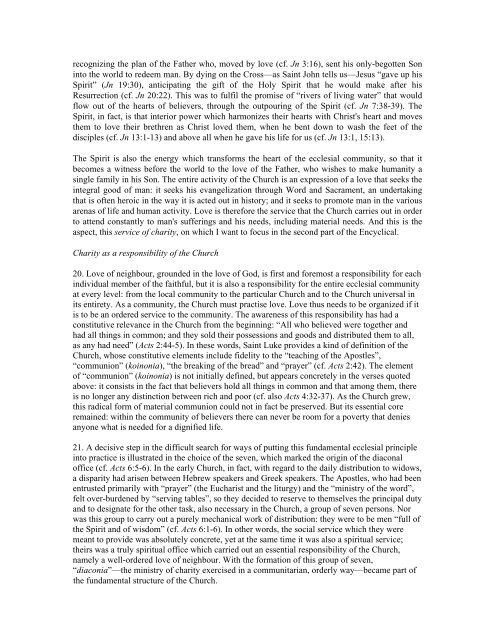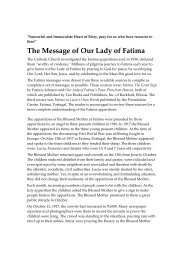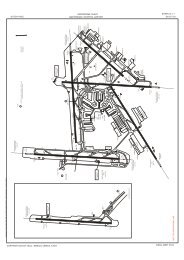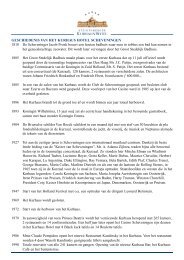God Is Love - Beeldbibliotheek
God Is Love - Beeldbibliotheek
God Is Love - Beeldbibliotheek
- No tags were found...
Create successful ePaper yourself
Turn your PDF publications into a flip-book with our unique Google optimized e-Paper software.
ecognizing the plan of the Father who, moved by love (cf. Jn 3:16), sent his only-begotten Soninto the world to redeem man. By dying on the Cross—as Saint John tells us—Jesus “gave up hisSpirit” (Jn 19:30), anticipating the gift of the Holy Spirit that he would make after hisResurrection (cf. Jn 20:22). This was to fulfil the promise of “rivers of living water” that wouldflow out of the hearts of believers, through the outpouring of the Spirit (cf. Jn 7:38-39). TheSpirit, in fact, is that interior power which harmonizes their hearts with Christ's heart and movesthem to love their brethren as Christ loved them, when he bent down to wash the feet of thedisciples (cf. Jn 13:1-13) and above all when he gave his life for us (cf. Jn 13:1, 15:13).The Spirit is also the energy which transforms the heart of the ecclesial community, so that itbecomes a witness before the world to the love of the Father, who wishes to make humanity asingle family in his Son. The entire activity of the Church is an expression of a love that seeks theintegral good of man: it seeks his evangelization through Word and Sacrament, an undertakingthat is often heroic in the way it is acted out in history; and it seeks to promote man in the variousarenas of life and human activity. <strong>Love</strong> is therefore the service that the Church carries out in orderto attend constantly to man's sufferings and his needs, including material needs. And this is theaspect, this service of charity, on which I want to focus in the second part of the Encyclical.Charity as a responsibility of the Church20. <strong>Love</strong> of neighbour, grounded in the love of <strong>God</strong>, is first and foremost a responsibility for eachindividual member of the faithful, but it is also a responsibility for the entire ecclesial communityat every level: from the local community to the particular Church and to the Church universal inits entirety. As a community, the Church must practise love. <strong>Love</strong> thus needs to be organized if itis to be an ordered service to the community. The awareness of this responsibility has had aconstitutive relevance in the Church from the beginning: “All who believed were together andhad all things in common; and they sold their possessions and goods and distributed them to all,as any had need” (Acts 2:44-5). In these words, Saint Luke provides a kind of definition of theChurch, whose constitutive elements include fidelity to the “teaching of the Apostles”,“communion” (koinonia), “the breaking of the bread” and “prayer” (cf. Acts 2:42). The elementof “communion” (koinonia) is not initially defined, but appears concretely in the verses quotedabove: it consists in the fact that believers hold all things in common and that among them, thereis no longer any distinction between rich and poor (cf. also Acts 4:32-37). As the Church grew,this radical form of material communion could not in fact be preserved. But its essential coreremained: within the community of believers there can never be room for a poverty that deniesanyone what is needed for a dignified life.21. A decisive step in the difficult search for ways of putting this fundamental ecclesial principleinto practice is illustrated in the choice of the seven, which marked the origin of the diaconaloffice (cf. Acts 6:5-6). In the early Church, in fact, with regard to the daily distribution to widows,a disparity had arisen between Hebrew speakers and Greek speakers. The Apostles, who had beenentrusted primarily with “prayer” (the Eucharist and the liturgy) and the “ministry of the word”,felt over-burdened by “serving tables”, so they decided to reserve to themselves the principal dutyand to designate for the other task, also necessary in the Church, a group of seven persons. Norwas this group to carry out a purely mechanical work of distribution: they were to be men “full ofthe Spirit and of wisdom” (cf. Acts 6:1-6). In other words, the social service which they weremeant to provide was absolutely concrete, yet at the same time it was also a spiritual service;theirs was a truly spiritual office which carried out an essential responsibility of the Church,namely a well-ordered love of neighbour. With the formation of this group of seven,“diaconia”—the ministry of charity exercised in a communitarian, orderly way—became part ofthe fundamental structure of the Church.












